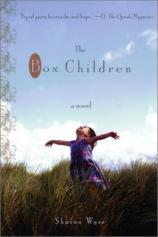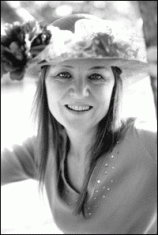Reading Group Guide
Discussion Questions
The Box Children

1. Lou Ann is unflinching in her desire to witness and to document the events unfolding around her during this fateful summer. She tells us that "I want to write everything down and I want people to see it" (p. 3). Why? What does this diary represent for Lou Ann? Is her keeping a diary a rebellious act, and if so, do you think she's fully aware of the risks she is running? On the other hand, are there ways in which this role of observer reinforces her passivity? Towards the end of the novel, her father tells her "You pay too much attention to things, honey" (p. 169). Do you agree? Ultimately, what does Lou Ann gain from her diary, and what does she lose?
2. One reviewer called The Box Children a "pastoral ode," but Lou Ann shows us that life on the farm is hard, and frequently nature holds as much threat as promise. To take her mind off the domestic disasters around her, Lou Ann makes up a list of other things she is afraid of-rattlesnakes, black widows, yellow jackets and purple wasps, chiggers (p. 89). What else on the farm is dangerous? How do you think her environment effects Lou Ann? The bulk of her diary takes place during harvest time-in what ways does the harvest serve as a metaphor for the personal events that take place in Lou Ann's life?
3. In what ways does Loretta assert control over Lou Ann? Over her husband? How does she use the body-her own and those of others-as a source of power? Are her methods fair? What kind of power do other characters in the story wield-physical, emotional, economical, spiritual-and to what end? What are the repercussions of the Campbells not owning the land they farm?
4. At the beginning of her diary, Lou Ann and her brother Will are close friends. They share comic books and secret jokes-"At the dinner table we can just look at each other and start laughing so hard we get in trouble" (p. 7). What changes that? How is the song that Will sings for Lou Ann representative of what comes between them that summer? How does their estrangement make Lou Ann vulnerable? Their father tells Will "You are getting whipped here for being stupid. There's nothing wrong with singing a dirty song but you don't EVER do it in front of a lady" (p. 51). In what other ways do their genders divide them? What does it take to bring them back together again?
5. For Lou Ann, her "box children" dolls are company-does she also use them as surrogates for the confusing emotions she's dealing with? How does she use them to work through her problems? During a later conference on the baby, she says that "I had to tell them to stop making up ways the baby will be OK because it will not. The time for hoping is over. They started crying and kept on a long time. I cried with them" (p. 153). Does it sometimes seem as if Lou Ann isn't comfortable with having feelings of her own? Why might that be? In a more typical "coming-of-age" story, Lou Ann might put aside the box children at the story's end, as a sign of her development. What do you think it means that she doesn't? How does her relationship with the box children change over the novel? In what ways does Lou Ann seem young for her age? In what ways is she older?
6. After Lou Ann asks Earl, the young "Wheatie," about her ankles and bad breath, she decides that "Some people might not care about fat ankles and bad breath the way Daddy and Mother do. That is good information to have" (p. 69). In what other ways to the Wheaties and the farmhands give Lou Ann a glimpse at a world outside the farm? What else does Earl represent for Lou Ann? Who are the "outsiders" in this book, and why do you think they appeal to Lou Ann ?
7. In what ways does Loretta make Lou Ann a conspirator in her plans and revenges? Why do you think Loretta needs to involve her daughter in what she likens to combat, telling Lou Ann, "You can't be on both sides in a war" (p. 88)? And how does Will end up on the other side, sharing his father's punishment? Ultimately, Lou Ann decides "I am not on either side of their war. I'm on my own side now" (p. 181). What helps her to make that decision?
8. How are the issues of trust and responsibility approached in this book? Loretta tells the farmhands that "Family takes care of family" (p. 151), but she doesn't stop Bill from feeling up Lou Ann, and he doesn't stop Loretta from carrying out her humiliating "tramp" punishment. Why do you think this is? Is Lou Ann right when she writes, "I guess me and my brother will have to make a good life for ourselves" (p. 104)? By the end of the book, Lou Ann's mother had abused her physically and emotionally, her father has molested her, her brother has betrayed her and spied on her. Only people outside the family-Lonnie, Earl, Alva-are safe. What do you make of this? Contrast this with Lou Ann's feeling of responsibility for the unborn baby, about whom she says "I want the baby to know that if there is something about Mother that makes being born seem like it might not be a good idea, I am right here to help" (p. 97).
9. The night before her birthday, Lou Ann has a dream about her mother floating naked in the swimming tank, her breasts and belly grotesquely swollen, noting also that "Long hair like the tops of corn ears was sticking up between her legs. Her lips and fingernails and toenails were painted bright smeary red" (p. 109). What does the dream suggest about Lou Ann's feelings about adulthood in general and her mother in particular? Do you see echoes in the tramp outfit her mother forces her to wear? In what ways is femininity regarded as a dangerous thing, a loss of control? When Lou Ann has her first period a few weeks later, she deals with it herself (p. 119)-how is this a transgression against her mother? Is Lou Ann a woman? Why or why not? What makes a woman?
10. Watching her father scrub after a day's work, Lou Ann remarks that "It amazes me that soap itself can get dirty" (p. 11). Later, she reports that Loretta has her cleaning the corners of the rooms, because "She says part of what happened with Daddy is her fault because she has not been vigilant against filth" (p. 98). What are other ways that the author deals with ideas of cleanliness, purity, innocence, and corruption? How are these issues tied up with religion in Lou Ann's family? How does Loretta's brand of Christianity reinforce some of her obsessions-particularly about what belongs in a "Christian home," and how does her illness warp her sense of religion? Is the church a place of comfort or conflict for Lou Ann? How are ideas of social status reinforced there, particularly in the way people treat Alva, and, later, Loretta?
11. Despite what appear to be rigid rules, truth and falsehood are seldom clear-cut in the Campbell family. Lou Ann isn't the only one keeping secrets and telling lies to cover her tracks-what are her mother's? Her father's? When Loretta tells the boy at the grocery store that Lou Ann's name is Penny Coffee, how does Lou Ann feel about the lie? Then, when Lou Ann comes up with the idea for switching her letters to Wyn Rue, she decides, "I think Penny Coffee would like that idea" (p.84). What do you think she means? Are there other personas that Lou Ann adopts during the book, willingly or unwillingly? What lessons is she learning about identity, as well as integrity?
12. After her miscarriage, Loretta climbs into the old refrigerator in the back yard with the dead baby. In what ways is this symbolic? Why do you think Lou Ann ultimately decides to let her out? What larger choices is she making in that action? How is Lou Ann's decision to bury the baby beneath the neglected rosebush in opposition to what she has seen and been taught on the farm? When Les comes back from the hospital, he tells the children, "Nature isn't perfect" (p. 178). What does he mean by this? Where else in the novel do we see nature's failings?
13. Discuss Lou Ann's list of the things she needs (p. 182): In what ways does it reflect her newfound maturity? In what ways does it indicate that she's still a child?
14. Lou Ann describes another dream where "I was still inside Mother and it was time to come out. I had a choice: Go out, or give up…if I gave up I'd never know the rest of the story. I wanted to know. The box children must have decided it wasn't worth it. I am the one putting them in the story after they already took themselves out" (p. 155-6). What do you think drives Lou Ann in her desire to put the box children "in the story?" What consolation does Lou Ann seem to derive from being able to step outside her life, viewing it as a narrative? Why do you think the author chose to tell this story by the means of first person diary entries? How does that form shape the narrative? What are some of its limitations and strengths? Is there another character in the book whose diary you would like to read? What do you think Loretta's diary would be like-or Will's, or Lonnie's?
The Box Children
- Publication Date: July 1, 2003
- Genres: Fiction
- Paperback: 192 pages
- Publisher: Riverhead Trade
- ISBN-10: 1573229962
- ISBN-13: 9781573229968







